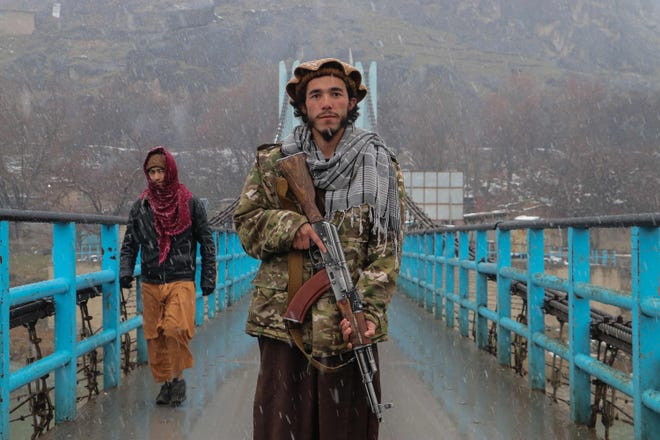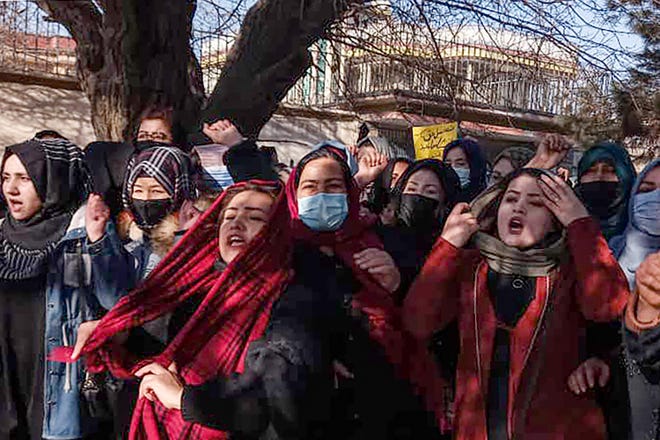Still heavy and scratchy from sleep, the “good mornings” come in hushed but eager voices.
It’s 7 a.m. in Afghanistan, but it’s not too early for the Afghan teen girls and women who meet secretly each week for a virtual English class that is based in New Jersey.
The cameras are off and their faces are hidden as the tiny chat windows on their phone and computer screens become windows to an increasingly distant world.
Some of the girls and women from 11 to 30 years old log in from Afghanistan while others, refugees who escaped the Taliban’s regime, call in from Pakistan, Bangladesh, Iran, Canada, or other temporary locations.
Their American teacher, Seth Holm, sits in an office in Princeton, New Jersey, at the Hun School of Princeton, a private, coeducational, secondary boarding school where he teaches English.
Born during the 20 years American military forces remained in Afghanistan after 9/11, most of the girls had never experienced life under Taliban rule.
The United States and its allies invaded Afghanistan in late 2001 and toppled its Taliban government. But, following the United States’ fast exit from the country in 2021, the Taliban returned to power and soon women were stripped of their rights. In December the Taliban closed schools and banned education for girls and women.
The secret classes are the only ones available for most of the girls and women. On a recent February day, the group, after some reassurance that identities would be protected, welcomed one more woman, this reporter from New Jersey.
“You see how your valuable lives and valuable thoughts and potential are somehow vanishing into nothing,” said one of the girls, whose name, like the rest of the cohort, is withheld for her protection.
Still suffering long after war
What started as a four-week class in English vocabulary in June 2022 has continued into February. The calls are a safe space to connect with the outside world after the dramatic loss of freedom the students have endured.
The project is the brainchild of Zahra, a 21-year-old Afghan whose last name is not published to protect her identity. She proposed the idea to Holm during a six-month residency at the Hun School in Princeton after she fled Kabul in October 2021.
Story continues below audio of girls talking.
Zahra received financial assistance from the Afghan Girls Financial Assistance Fund, a New Jersey-based group that supports Afghan students who are admitted to American universities and schools. AGFAF also requires its scholars to do service projects to benefit their country.
Now a student at an American university, Zahra recounts what inspired her to give back.
Sitting in a math class at the Hun School, a loud noise made her want to run for her life..
“I thought I have to get out of this room,” she said. “I thought it was an explosion. I was so scared, I stood up.”
But looking around, it seemed the American students had not even noticed the disturbance.
Far away from Kabul and safely ensconced in Princeton, she was still haunted by the trauma of war. That, said Zahra, forced the question: “Why do we have to suffer like this?”
She cried for days afterward, but out of that was born the idea of a class to help girls like her.

A GoFundMe campaign raised $900 to pay for students’ internet expenses and SIM cards in their countries.
“Meeting Zahra was a pivotal time in my life,” said Holm, who has since become a confidante as much as a teacher to the girls. “I have my own family, and my Afghan family.”
The 30 or so students log in nearly every week. Some of them also mentor younger girls in Afghanistan and most have a “phone buddy” in the United States to talk to. AGFAF stepped in to fund new classes at $2,500 for six months of internet expenses for future students. The Hun School created two scholarships for Afghan girls relocating to the United States.
Afghan girl: ‘I don’t feel anything anymore’
On a Thursday night in February, the group discussed “Dancing in the Mosque,” a memoir by Homeira Qaderi, a novelist who left Afghanistan and was forcibly separated from her infant son when she did not accept her husband’s decision to take a second wife.
Qaderi’s story was painfully real for the girls, who discussed the book in the frame of their own troubles and dreams. What if they had a chance to leave Afghanistan? What did they think about the Taliban?
Their responses were uncannily wise, and honest.
“During my childhood, I always believed I will become happier. Everything was enjoyable for me, the animals, the kids, the flowers,” said Girl 1. “But I don’t feel anything anymore,” referring to her life in present-day Afghanistan where even video lessons are a potential risk. “I made a promise to myself that wherever I go, the situation of Afghan women should change. So if I go…I will try my best to do something for Afghan women.”
But that meant getting an education and securing her own safety first. “Before I can do something for Afghan women, I need to do something for myself,” she said.
“I used to write, before Taliban, but right now every day I’m losing my words,” said Girl 2. She wants to write a book, but she is still in the grip of numbing shock. “I need a change for myself because I don’t have any feeling right now. I’m somehow neutral, I just record everything to my mind and maybe when I can feel everything around me, at that time I can write,” she said.
How one woman fled Afghanistan:Staying could mean death. The escape nearly killed her.
“People who live outside of Afghanistan, they are lucky, their life is full of joy. But we are not because we were born here, we have witnessed the loss of our loved ones, instead of seeing our parents happy, we have seen their tearful faces,” said Girl 3. “The most painful thing is being a girl here. We know how it feels…to be a non-being, confined in a cage…to always be known by the name of your father, brother or husband and have no identity of our own.”

And yet their optimism and girlish enthusiasm for food, life and love, was abundant.
“Everything is possible if you take the action,” said Girl 4. “I would say to people you can have a great impact on…on helping some people in the corner of the world which is facing a lot of challenges and violence.” She thanked Holm and said he was one example of this.
‘I had just started college life’
Speaking in almost-fluent English learned during the American occupation, it was clear the girls never imagined their lives would change overnight. In August 2021, the Taliban moved into Kabul after the U.S. military evacuated.
“I live in Afghanistan, but I feel as if I left it. So much changed in such a short time,” said Girl 3.
Zahra said she was enrolled in Kabul University with her sister when the Taliban came.
“It was a huge difference, from one day to the other day,” said Zahra.
“It was a normal Saturday when I went to school and came back,” she said. The next morning, her father told his daughters they should stay home. News had spread that the Taliban was entering the city. It was not safe to leave home, but Zahra went out anyway, to see if she could secure a passport for her mother. The typically bustling city was filled with fear, she said. “I was seeing that the shops were closed, there was no public transportation, people were so worried, they were not able to work…”
‘I cannot pretend to be OK’:Afghan refugees torn between new lives in US and haunting reality of home
‘Death in slow motion’:Women in Afghanistan cope with fear, loss of rights under Taliban rule
The family soon fled Afghanistan. Her father, a colonel in the Afghan army with ties to American forces was fearful for his life after the Taliban came searching for him.
Her mother stopped the forces at the front door while Zahra and her father hid. It was early enough in the days of regime change, said Zahra, that her mother’s courage and the Taliban’s fear of drawing attention from neighbors gathered outside the house, helped to spare her family.
Singing, music forbidden by Taliban
During the virtual February class, a Hun student sang Celine Dion’s “My heart will go on,” and a slew of reaction emojis filled the chat. Singing and music are considered “haram,” or forbidden, by the Taliban, but in the relative safety of their homes, the girls listened in delight, bursting into praise.
There were questions about vocabulary: “Would you please spell the alternative word for damn,” asked one student.
Darn, Holm said.
What about “heck?”
That was a baby-swear, he answered in all seriousness. “Use it in the familiar register” with friends, not a boss, Holm told the girls.
Despite early promises of moderation, the Taliban have also restricted employment for women and required them to wear head-to-toe clothing with face coverings up to their noses, said Zahra.
So, what was the class’ reaction, asked Holm, to “Dancing in the Mosque” where a girl defied tradition and fell in love with a young Taliban boy?
The students were divided. Some said they sympathized with the boy, who dies in the memoir, because he had never wanted to become a Talib — a member of the Taliban. His circumstances forced his choice to become a Talib, they said, because of poverty and brainwashing by hardliners.
In some provinces in Afghanistan, the Taliban are teaching children commands and training them to carry weapons “on their shoulders,” said Girl 4. “They are children – I become very sorrowful because they are children and they have weapons instead of pen and paper.”
‘Not my brother anymore’
Even then, was it possible to have empathy for these men who were so brutally ripping away the freedoms they had come to take for granted for two decades? Girl 5, who now lives in bordering Pakistan, spoke about former Afghan politicians’ efforts at diplomacy with the Taliban by calling them “brothers.”
“A brother who kills my other brothers is not my brother anymore,” she said, referring to the violence unleashed by the Taliban government on its critics. But with a smile that rang out in her voice, the same girl said she could relate to the memoir’s romance between the heroine and a Talib, “because to be honest some of the Taliban are really good looking. Those dirty turbans on their head, their trousers pushed up so high and as Humeira describes their “kohl-lined” eyes – it adds to their beauty.”
“But jokes apart,” she said, she could never love a Talib.
Another student in the same class “begged” the world to never recognize the Taliban as a legitimate government.
Yet the girls talked about the country they loved, its delicious food and the perfect Kabul weather. It sounded as if the beauty of Afghanistan is a memory even for those who remain there. One girl who fled said leaving Afghanistan made a “hole in the heart”.
“The weather of Kabul is itself a paradise – without the Taliban, Afghanistan is a paradise,” said another girl, who has also since left the country. “The most important thing we leave behind is our identity; even if we go to a new place where we get permanent residence, the native people will ask us where we are originally from.”
The girls told Holm he had changed their lives simply by showing that they “mattered” to him. They thanked the reporter for doing the “precious work” of telling their stories, and asked what she thought of Afghanistan’s situation now, under the Taliban? Then they logged off to return to their lives and routines, until the next class.


